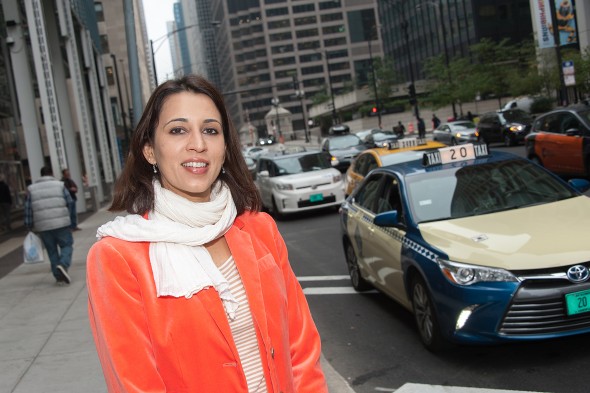What drives taxi trade in Mumbai? anthropologist asks

In Mumbai, India, “at least one son in each family follows his father into taxi-driving,” says anthropologist Tarini Bedi. Photo: Roberta Dupuis-Devlin/UIC Photo Services
A skilled trade, with sons following fathers into the profession. That’s taxi driving in Mumbai, India.
Tarini Bedi, assistant professor of anthropology in the College of Liberal Arts and Sciences, is writing a book on the subject, Everyday Technologies of the Urban: Motoring and Mobilities in Bombay/Mumbai’s Taxi Trade.
The first taxis in Mumbai (formerly Bombay), at the beginning of the 20th century in then-British colonial India, were horse-drawn Victorian hackney carriages known colloquially as “huckneys.”
The stables owned by the prince of Palanpur in Gujarat employed a community of Muslims, “and since they knew so much about horses, they went into the taxi trade,” said Bedi (pronounced BAY-dee).
In the 1960s Premier Automobiles Limited produced the Padmini, named for an Indian princess. “It became the icon of the taxi,” Bedi said. “It looked a lot like an old Fiat.”
Bedi included mechanics and spare-parts smugglers in her research.
“I’m not the least bit interested in passengers,” she said. “My focus is on labor and governance of the taxi rather than the user. All of us know what it’s like to sit in a taxi.”
The taxi industry “is one of the most regulated businesses in the world,” Bedi said. “I had not realized how much politics was involved.” For her research, Bedi lived in the Mumbai community of self-employed drivers. “I found that it is a hereditary profession,” she said. “At least one son in each family follows his father into taxi-driving.”
New cabs that belong to large fleets have GPS, and owners keep track of where they are. “Drivers lose autonomy,” she said. “They’re required to drive a certain numbers of hours per day.”
Mumbai has 38,000 to 40,000 taxis serving a population of 18.5 million to 21 million. This is roughly proportionate to Chicago, with 7,000 cabs and 2.7 million people.
Bedi examined newspapers, government documents and the records of two drivers’ unions, formed in 1924 and 1962.
“There have been many books on the social history of taxis in Western cities,” she said. “As far as I know this will be the first book-length, academic and historical investigation into the taxi trade of a postcolonial city.”
Dashing, bashing ladies
It’s her second book. Due out next May is The Dashing Ladies of the Shiv Sena: Political Matronage in Urban India.
Shiv Sena is a militant right-wing political party, the name translating as “army of Shivaji,” a 17th century warrior king.
“The women run for elections and become grass-roots organizers,” Bedi said. “The government doesn’t work for people. They end up providing services the government normally would provide.”
The “dashing ladies,” as they call themselves, are sometimes bashing ladies. In an article for the Journal of International Women’s Studies, Bedi writes, “A key practice for these women has been the cooption of violence — what has been referred to as the feminization of violence.”
She added, “They beat people up. Some have compared them to gangsters.”
Bedi was born in southern India, in Madras, now called Chennai. She lived for some years in Hyderabad before moving to Mumbai, where she spent much of her adolescence.
“I learned English as a child, went to school in English and spoke English as much as I did in Indian languages,” she said. “Indians are famous for using a strategy known as ‘code-switching,’ where we use more than one language in the same conversation and often even in the same sentence. This is because most Indians have at least two ‘mother tongues’ or ‘first languages’ and English is often one of them for urban Indians.”
Bedi came to this country to attend college. She earned a bachelor’s degree in social sciences and theater at Bennington College, a master’s degree in political science at McGill University in Montreal, and a master’s and Ph.D. in anthropology at UIC.
She lives in Hyde Park with her husband, Dhruv Mubayi, professor of mathematics, statistics and computer science in the College of Liberal Arts and Sciences, and their 11-year-old daughter, Maya.
She loves to travel and play the sitar.
“Recently I became an avid Zumba fan, and I’m training to be a Zumba trainer,” Bedi said. “Basically it’s because I love to dance and need an excuse to do it.”
